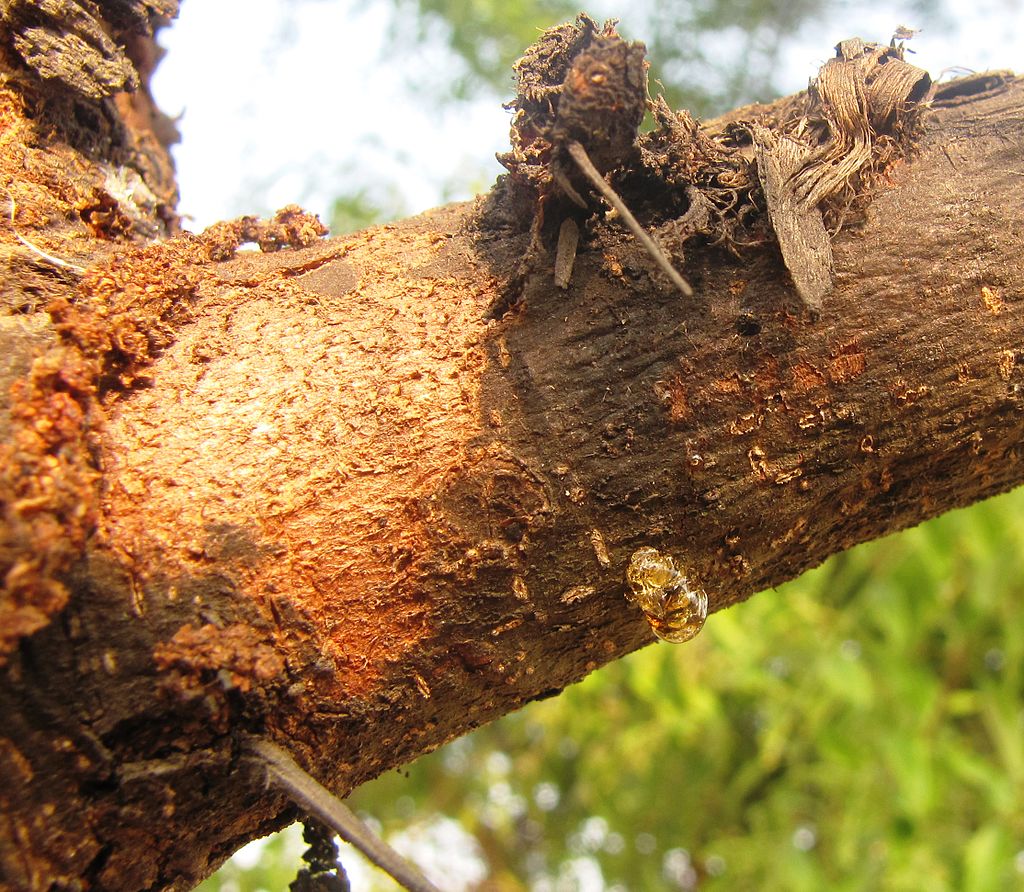Gum arabic exuding from the Babhul tree (Vachellia nilotica): Photo: Ashwin Baindur via Wikimedia Commons
BACKGROUND
Forests and trees provide goods and services that are key assets for reducing vulnerability to the effects of climate change. The forest contributions to climate change adaptation are critically important in African dryland ecosystems that face many climate-related challenges, including recurrent drought, erratic and scanty rainfall patterns which negatively affect livelihood options of dependent communities. In fact, dryland communities are characterized as the poorest and most vulnerable of the continent, frequently exposed to conflicts over limited resources as well as household food insecurity. It is therefore prudent that alternative livelihoods options, for example, through diversification, should be promoted as coping strategies to improve the resilience of these climate sensitive populations. Sustainable exploitation and trade of non-timber forest products are widely documented for their contribution to livelihoods of local communities. Dry forests are endowed with a rich diversity of woody species, many of which are known to produce a variety of non-timber forest products such as commercial gums and resins. As documented for many NTFPs, the exploitation and trade in gums and resins has strongly emerged as an alternative livelihood support and climate resilient strategy for African dryland communities. Moreover, gums and resins products are traded locally and are also part of cross-border markets, thus providing many socioeconomic,
cultural, and medicinal values, in addition to important environmental functions of the trees.
However, in many African countries, the production of gums and resins has been assessed to be far below their effective potential. Further, producers of gums and resins usually have little economic incentive to manage dry forests responsibly due to inconsistent low price they receive as compared to other actors of the value chain.. Underdeveloped markets and value chains and lack of financial capital and technical skills are key constraints facing gums and resins sector. Preliminary studies on gums and resins value chain analysis in selected countries highlight the active role of women and youth as the main producing actors.
In their effort to strengthen the capacity for production and trade of gums resins for African forestry stakeholders, mainly women, youth and vulnerable communities living in drylands areas more sensitive to climate change, AFF in collaboration with the Network for Natural Gums and Resins in Africa (NGARA) assess the training needs among the actors involved in the sector in four selected countries i.e., Kenya, Sudan, Ethiopia, Niger and Burkina Faso. One of the key finding of the studies highlighted very weak capacity, as well as for value addition, entrepreneurial skills and business management. Also, inadequate technical capacities among stakeholders in African forestry to develop bankable projects for accessing financial resources needed to develop their business implementation remains a significant challenge. In order to address some of these challenges, AFF is engaged since 2021, in building capacity of African forestry stakeholders, including those involved in gums and resins and other NTFPs for development of bankable project that could facilitate access to required resources for sustainable and profitable businesses.
However, for these resources to be efficiently used and contribute to the development of the sector, there is a need to also strengthen the skills of the stakeholders the business NTFP based enterprises.
RATIONALE AND PURPOSE OF THE WORK
AFF, in its annual work plan 2022 on the “African Forests, People and Climate Change” project, is recruiting national experts, one each for Kenya, Tanzania, Niger and Burkina Faso to facilitate establishment/operationalization of organized bodies/entities for business in gums and resins in
the selected five countries.
This assignment will specifically focus on imparting knowledge and skills to actors in business management, value addition, quality control and marketing and trade.
SPECIFIC TASKS
In each selected country, the expert will develop training materials to enable the actors to acquire necessary skills for managing a successful business. The materials should include, but not limited to, the following aspects:
a) Development of business plans
b) Business management: how to manage human resources, people, supply chain management,
bookkeeping, finance, and marketing.
c) Value addition
d) Quality control measures
e) Marketing: advertising, marketing strategies, branding, copywriting, customer relation
management, event planning, etc.
f) Trading: trading mindset, risk management, trading system, market security etc.
MINIMUM QUALIFICATIONS AND SKILLS
The interested applicant should meet the following minimum qualifications and skills:
a) Have a at least a master’s degree in natural resources management with a good knowledge of forestry, environmental/natural resources economics, climate change finance, marketing, business administration, or related subjects; A PhD will be an added advantage
b) Be a research-development scientist with proven knowledge and experience in designing, monitoring, evaluation and reporting of forestry and/or natural resources-based development projects;
c) Have experience and knowledge of institutional and policy frameworks governing SMIs, SMEs and business environment in the selected countries; and
d) Excellent written and oral communication skills in English for Anglophone and French for francophone Africa.
APPLICATION REQUIREMENTS
The applicant shall submit the following:
(i) Cover letter stating how the above qualifications and experience requirements are met.
(ii) A brief proposal/concept note containing:
(a) Detailed approach to undertake the assignment.
(b) The detailed outline of the training modules
(c) A tentative programme for the training
(iii) Curriculum vitae.
DEADLINES
• Applications must be received by the AFF Secretariat before 20 July, 2022 for Niger.
• Results of the selection will be announced to successful applicant by 25 July, 2022.
• Selected applicants will hold a skype meeting with AFF secretariat to discuss and agree on the approach and workplan in all the targeted countries not later than 29 July, 2022.
HOW TO APPLY
All applications must be submitted by e-mail with the subject line: Consultancy No 2- 3.1.3.1 “Strengthening capacity of stakeholders in African forestry on business enterprises on gums and resin value chains” to Prof. Marie Louise A. T. Avana-Tientcheu, Dr Djibril S. Dayamba
(D.Dayamba@cgiar.org) and Dr. Daud Kachamba of the AFF Secretariat through the following e-mail addresses: m.avana@cgiar.org, d.dayamba@cgiar.org and d.kachamba@cgiar.org and copied to exec.sec@afforum.org
For more information, download:

